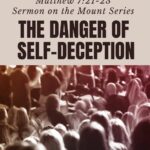EP 147: The Danger of Self-Deception (Matthew 7:21-23 – Sermon on the Mount Series)

As we continue our time in the Sermon on the Mount, we have the warning in Matthew 7:21-23 of two alternatives laid before us. Depending on where we fall determines our eternal destiny.
Jesus is addressing those who believe they are in the kingdom, but they are not. There is no neutrality with Jesus – it’s black and white. You are either a Christian or you are not a Christian. You are either born again, or you are dead in your sin. You are either a child of God or a child of Satan.
1 John 3:10:
10 By this, it is evident who are the children of God, and who are the children of the devil: whoever does not practice righteousness is not of God, nor is the one who does not love his brother.
John Stott stated on this passage, “Jesus is confronting us with Himself.“
Matthew 7:21-23:
21 “Not everyone who says to me, ‘Lord, Lord,’ will enter the kingdom of heaven, but the one who does the will of my Father who is in heaven. 22 On that day many will say to me, ‘Lord, Lord, did we not prophesy in your name, and cast out demons in your name, and do many mighty works in your name?’ 23 And then will I declare to them, ‘I never knew you; depart from me, you workers of lawlessness.’
J.C. Ryle stated on this passage – “The Lord Jesus winds up the Sermon on the Mount by a passage of heart-piercing application. He turns from false prophets to false professors, from unsound teachers to unsound hearers.
Martyn Lloyd Jones, when he considered this section, said:
“These surely are in many ways the most solemn and solemnizing words ever uttered in this world, not only by any man but even by the Son of God Himself.”
Since these are the words of Jesus and not just any man – we need to give them our utmost attention. We worked through last time together on the warning about false teachers or false prophets to not be misled by them. They were wolves in sheep’s clothing, and now today, we have the warning about us as being self-deceived. In this text, Jesus is making a statement here, too, of the reality that we will all stand before God in final judgment.
We already know from our previous time in the sermon that there will be few who enter by the narrow gate and many on the road to destruction. (Matthew 7:13-14).
In our time in the Sermon, we’ve seen that Jesus set forth the divine standards of His kingdom, and we can sum them up in one word – righteousness.
Matthew 5:20:
20 For I tell you, unless your righteousness exceeds that of the scribes and Pharisees, you will never enter the kingdom of heaven.
Entrance into the kingdom is dependent upon a righteousness that exceeds that of the scribes and Pharisees, a divine righteousness that comes from God, and it is beyond our human capacity to attain.
The scribes and the Pharisees outwardly seemed to do all the right things – they prayed and fasted and didn’t murder or commit adultery – they seemed outwardly to follow the law perfectly but inwardly were as Jesus described in Matthew 23:27 – like whitewashed tombs, which outwardly appear beautiful, but within are full of dead people’s bones and all uncleanness.
The sermon on the mount shows us the inadequacy of human resources to deal with God’s kingdom, and it brings us to the point of recognizing our great need for God’s grace and His righteousness.
John MacArthur stated:
“The purpose of The Sermon on The Mount then is identical to the purpose of the law of God in the Old Testament. When God gave the law on Sinai, the law was not given in order to show man how good he must be. The law was given to show man how good he couldn’t be, how bad he was, how short he came.
And Paul summed it up when he said, “For all have sinned and come –” What? – “short of the glory of God.” And Paul says that “The law was our schoolmaster to drive us to Christ.” The law was what whipped us. And that is essentially what is going on in The Sermon on The Mount. Jesus is upholding the law of God.”
The standard has stayed the same, and we need to see how short we fall – Blessed are the poor in spirit; those blessed are the ones that realize they are spiritually bankrupt before the Lord.
The gospel tells us we have no right to be in the presence of God, but if we believe in Jesus, who died in our place, bore the punishment for our sins, and granted us His righteousness, we can then enjoy being in God’s presence forever.
Our acceptance before God is fully by His Grace and mercy. It is only because Jesus lived the perfect life we couldn’t live, died the death we deserve, and took on all the punishment for our sins upon Himself at the Cross, and then He rose again! By His Wounds, we are healed.
Nothing in my hands I bring simply to the Cross I cling to.
Listen to EP 147: The Danger of Self-Deception:
Resources & Links Mentioned in this Episode:
The FREE Building, a Christ-Centered Home Bundle, is designed to help Christian women establish a strong foundation for their family’s spiritual life and cultivate a home environment that honors God. This bundle is a collection of digital tools and resources. It includes products related to parenting, marriage, family, Bible study, finance, and business, as well as practical resources to help women incorporate faith into their daily routines and more. Sign-up to receive your free bundle on the button below or here.
Sermon on the Mount Series
Thankful Homemaker Newsletter
Questions to Examine Yourself to See if You are in the Faith (2 Corinthians 13:5)
Bella Paper – Use Code Thankful10 to get 10% off your purchase
Open Hearts in a Closed World Conference
G3 Conference – Use Code G3TH for 30% off your Registration
Show Notes:
“A man who does not say, Lord, Lord’ shall never enter the kingdom of heaven. That is, of course, the starting -point in this whole question of salvation. No man is a Christian unless he says Lord, Lord’ to the Lord Jesus Christ.”
~ Martyn Lloyd Jones, Studies in the Sermon on the Mount
“We who claim to be Christians in our day have made a profession of faith in Jesus privately in conversion and publicly in baptism. We appear to honour Jesus by referring to him as ‘the Lord’ or ‘our Lord’. We recite the creed in church, and sing hymns expressive of devotion to Christ. We even exercise a variety of ministries in his name. But he is not impressed by our pious and orthodox words. He still asks for evidence of our sincerity in good works of obedience.”
John Stott, The Message of the Sermon on the Mount
“When a couple lives together without being married when a person practices homosexuality, is deceptive and dishonest in business, is hateful and vengeful, or habitually practices any sin without remorse or repentance, such persons cannot be Christian—no matter what sort of experience they claim to have had or what sort of testimony they now make. The person who professes to be a Christian but who habitually and unrepentantly continues in known sin makes out God to be liar, because His Word expressly denies that any such person belongs to Him (1 John 3: 6-10).”
“A person who is not concerned about having his present sins cleansed has good reason to doubt that his past sin has been forgiven.”
“He lives in a constant state of sinfulness, with no thought of confessing and forsaking his sin or of seeking after righteousness. He looks to feelings, experiences, healings, angels, earthly material blessings, promises, and a host of other external things for proof of his salvation. He is not concerned about decreasing sin or increasing righteousness. He is not concerned about God’s commands, God’s standards, or God’s glory, but only what he can get out of God for himself. As Martyn Lloyd-Jones suggests, he is more concerned about the by-products of the faith than the fruit itself.”
~ John MacArthur, Matthew 1-7 Commentary
“On the last day, these prophets will say to Jesus, ‘Did we not prophesy in your name,…and drive out demons and perform many miracles? But Jesus will reject their claims to him. Why? They placed success before obedience (only those who do the will of the Father belong to the kingdom – verse 21). They put their own position before their service. Most obviously, they substituted gifts for grace.
For all their mysteriousness, Jesus’ words teach us a basic lesson in spiritual discernment: it is possible to exercise ‘spiritual gifts’ (prophecy, miracles, exorcism of demons are specifically mentioned in verse 22), yet be a total stranger to God’s saving grace. The astounding things men can do in public is no certain indication of where they stand in private before the judgment of Jesus Christ. What really counts is how we are related to Christ himself. That is why the gospel has so much more to say about the power of Christ changing our characters than about the power of Christ changing the course of nature.
That distinction is a timely warning to our own generation. We are as easily mesmerized by people with unusual powers as was our Lord’s generation. We are fascinated by ‘signs.’ But Jesus is not a wonder-worker; he is a Saviour. He delivers us from sin and transforms us morally to be like himself. That is the fruit of the true prophet of God. The true prophet is far more interested in grace than in gifts—both in his own life and in the lives of those to whom he ministers.
You have chosen the gate through which you will go. But have you continued to expose your life to the influences that will keep you on the way of Christ? Or have you been sidetracked by false teaching and teachers, failing to recognize the sour and harmful fruit they will produce in your life? ‘Watch out for false prophets,’ says Jesus.”
~ Sinclair Ferguson, Sermon on the Mount
“Thus speaketh Christ our Lord to us, You call Me master and obey Me not, you call Me light and see Me not, you call Me the way and walk Me not, you call Me life and live Me not, you call Me wise and follow Me not, you call Me fair and love Me not, you call Me rich and ask Me not, you call Me eternal and seek Me not, if I condemn thee, blame Me not.”
~ Words from a Cathedral in Lubeck Germany:
Scripture References:
- Matthew 7:21-23
- 1 John 3:10
- Matthew 7:13-14
- Matthew 5:20
- Matthew 23:27
- 1 John 2:4-5
- Romans 10:9-10
- 1 Corinthians 12:3
- Luke 6:46
- James 1:22-25
- 2 Corinthians 13:5
- 1 John 1:6-10
- 1 Corinthians 6:9-10
- Ephesians 5:5-6
- 1 John 3:6-10
- Matthew 7:15-20
- Numbers 22-25
- Luke 10:17
- Matthew 24:24
- Ephesians 2:2
- Matthew 5:6
- John 6:37
Recommended Resources:
- Studies in the Sermon on the Mount by Martyn Lloyd Jones
- Sermon on the Mount The: Matthew 5-7 Expositional Commentary by James Montgomery Boice
- Matthew 1-7 MacArthur New Testament Commentary by John MacArthur
- Expository Thoughts on the Gospel of Matthew by J.C. Ryle
- The Sermon on the Mount: The Message of the Kingdom (ESV Edition) by R. Kent Hughes
- Sermon on the Mount by Sinclair Ferguson
- The Beatitudes: An Exposition of Matthew 5:1-12 by Thomas Watson
- The Message of the Sermon on the Mount by John Stott
- Sermon on the Mount Teaching Series by Sinclair Ferguson at Ligonier Connect
- Logos Bible Software
- Bible Memory App
- Study Guide for Sermon on the Mount



